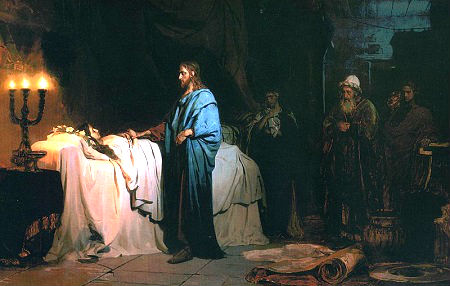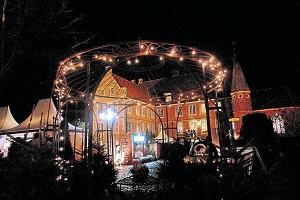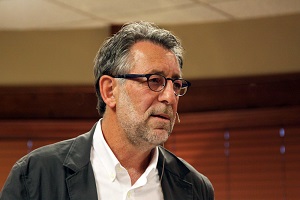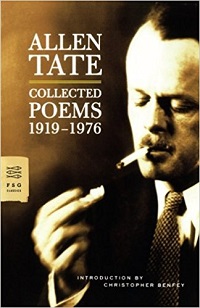
De opwekking van de dochter van Jaïrus door Ilja Repin, 1871
Am fünfundzwanzigsten Sonntage nach Pfingsten
Evang.: Von des Obristen Töchterlein
Weck’ auf, was schläft; streck’ aus die Hand,
Du Retter Gott! Betäubung liegt
Auf meinem Geist, ein bleiern Band.
Er ist nicht tot, nur schlafbesiegt,
Nur taumelnd trunken, ein Helot,
Der knirschend schlang in Sklavennot
Den Wein, so der Tyrann ihm bot:
So nieder liegt in mir, was da vom Rechten.
Ja, in den schwersten Stunden doch
Blieb ein Bewußtsein mir, daß tief
Wie in des Herzens Keller noch
Verborgen mir, ein Erbteil, schlief,
Gleich warmer Quelle, die hinab
Versickert in der Höhle Grab
Und droben läßt den Herrscherstab,
Frost, Sturm und Schnee, um ihr Besitztum fechten.
Und der Tyrann, so niederhält
Mein bestes und mein einz’ges Gut,
Nicht Trägheit ist’s noch Lust der Welt;
Es ist der kalt gebrochne Mut,
O, wie ich tausendmal gesagt,
Verstandes Fluch, der trotzig ragt
Und scharf an meinem Glauben nagt:
Weh’, ein Geschenk, verfallen bösen Mächten!
Zu einer Zeit, schwarz wie die Nacht,
Zu einer Zeit, die ich erlebt,
Da war ich um mein Heil gebracht,
Wie dürres Blatt am Zweige bebt.
Trostlos und ohne Hoffnung war
Unglaube wie die Sonne klar;
Mein Leben hing an einem Haar:
O, solche Stunde gönn’ ich nicht den Schlechten!
Soll ich es sagen, daß die Not
Gesteigert ward durch Menschenmüh?
Nicht weiß ich, was dem Staub gebot;
Doch unglückselig sah ich sie,
Auflachend nur in Krampfes Spott,
Frech, doch vernichtet, ohne Gott,
Unsel’ge, aber arme Rott’,
Um das verzweifelnd, was sie möchten ächten.
Schwach hieß, wer ohne Zucken nicht
Ins Auge der Vernichtung sah;
Doch in dem Blicke lag Gericht,
Dem Lächeln Todesschauer nah.
Warum man nicht in Ruh mich ließ,
Im Freundschaftsmantel überdies,
Als ob der Arzt das Messer stieß?
Ich weiß es nicht, doch will ich drum nicht rechten.
So höret denn, was mich geschützt
Vor gänzlichem Verlorengehn:
Daß ich Unglauben nicht benützt,
Des Frevels Banner zu erhöhn;
Und der Entschluß gewann den Raum,
Ob mir gefällt des Lebens Baum,
Zu lieben meines Gottes Traum
Und auch dem Toten Kränze noch zu flechten.
Unglaub’ ist Sünde; aber mehr:
Sünd’ ist Unglaube; sie allein
Mag aller Zweifel frost’gem Heer
Der stärkste Bundesgenosse sein.
O, wär’ ich tugendhaft, dann ließ
Nicht einsam mich die Finsternis;
Fällt doch ein Strahl in mein Verlies
Weil ich nicht gänzlich zugesellt den Schlechten!
Ein Kleinod hab’ ich mir gehegt,
Da mein Bewußtsein, ob befleckt,
Doch nicht in Schnee und Eis gelegt
Und nicht in Lava sich gestreckt.
Ach, Odem noch die Liebe hat,
Die Hoffnung treibt ein grünes Blatt,
Und auch der Glaube todesmatt
Faltet die Hände, ob sie Segen brächten.
O reiche, Gnäd’ger, deine Hand,
Wie du dem Mägdlein sie gereicht!
Zerreiß der dumpfen Träume Band,
So mächtig mir und dir so leicht!
Ja, mag dein Odem drüber wehn,
Ein Strahl aus deinem Auge gehn:
Dann ist wohl da, was auferstehn
Und was fortan in deiner Schar mag fechten.

Annette von Droste-Hülshoff (10 januari 1797 – 24 mei 1848)
Burg Hüllshoff, het geboortehuis van de dichteres tijdens het jaarlijkse Winterträume-festival
Zie voor de schrijvers van de 19e november ook mijn twee vorige blogs van vandaag.


